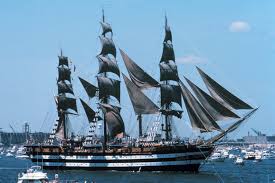ship
英 [ʃɪp]
美 [ʃɪp]
- vt. 运送,乘船;以船运送
- vi. 上船;乘船旅行;当船员
- n. 船;舰;太空船
- n. (Ship)人名;(中)摄(广东话·威妥玛)
CET4 TEM4 考 研 CET6
ship 大船,舰,船运,运输来自古英语 scip,船,来自 Proto-Germanic*skipa,船,掏空物,来自 PIE*skep,切,分开,来自 PIE*skei,切,分开,词源同 shape,-scape.来自早期掏木为船的原始做法,比较 boat.
- ship
- ship: [OE] Ship comes from a prehistoric Germanic *skipam, which also produced German schiff, Dutch schip, Swedish skepp, and Danish skib. It is not known for certain where this came from, although a link has been suggested with Latvian shkibīt ‘cut, hew’, in which case the underlying meaning of ship could be ‘hollowed-out log’ – a ‘dugout’, in other words.
The Old High German form schif was borrowed into Italian as schifo, and this made its way via French esquif into English as skiff [16]. The Middle Dutch form schip had a derivative schipper ‘captain of a small ship’, which has given English skipper [14]. And equip too comes from a relative of English ship.
=> equip, skiff, skipper - ship (n.)
- Old English scip "ship, boat," from Proto-Germanic *skipam (cognates: Old Norse, Old Saxon, Old Frisian, Gothic skip, Danish skib, Swedish skepp, Middle Dutch scip, Dutch schip, Old High German skif, German Schiff), "Germanic noun of obscure origin" [Watkins]. Others suggest perhaps originally "tree cut out or hollowed out," and derive it from PIE root *skei- "to cut, split."
Now a vessel of considerable size, adapted to navigation; the Old English word was used for small craft as well, and definitions changed over time; in 19c., distinct from a boat in having a bowsprit and three masts, each with a lower, top, and topgallant mast. French esquif, Italian schifo are Germanic loan-words.
Phrase ships that pass in the night is from Longfellow's poem "Elizabeth" in "Tales of a Wayside Inn" (1863). Figurative use of nautical runs a tight ship (i.e., one that does not leak) is attested from 1965. - ship (v.)
- c. 1300, "to send or transport (merchandise, people) by ship; to board a ship; to travel by ship, sail, set sail," also figurative, from ship (n.). Old English scipian is attested only in the senses "take ship, embark; be furnished with a ship." Transferred to other means of conveyance (railroad, etc.) from 1857, originally American English. Related: Shipped; shipping.
- 1. She mispronounced ship as sheep.
- 她把ship念成sheep了.
来自《简明英汉词典》
- 2. 'ship " doesn't rhyme with'sheep ".
- Ship 和 sheep 不押韵.
来自《简明英汉词典》
- 3. Captain Cook safely navigated his ship without accident for 100 voyages.
- 库克船长驾驶的船安全出航100次无事故。
来自柯林斯例句
- 4. Sailors hung about while they waited to ship out.
- 水手们在等待离港的时候四处闲逛。
来自柯林斯例句
- 5. In a naval battle your aim is to sink the enemy's ship.
- 在海战中目标就是击沉敌船。
来自柯林斯例句
[ ship 造句 ]
